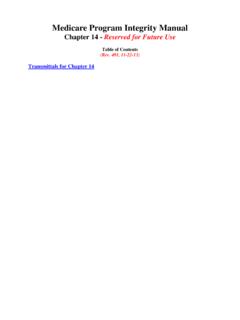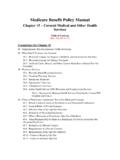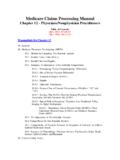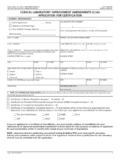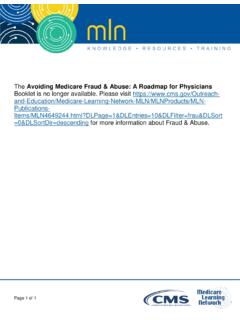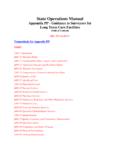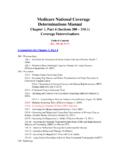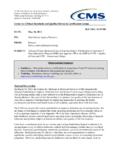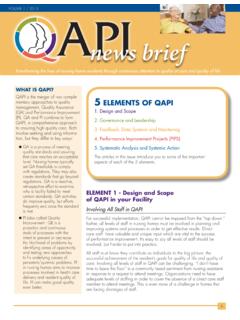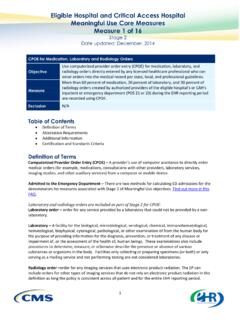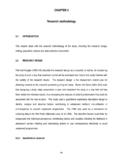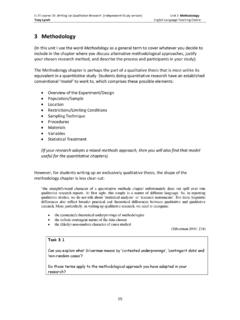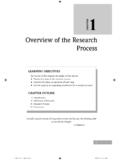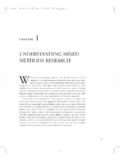Transcription of Medicare Benefit Policy Manual - Centers for …
1 Medicare Benefit Policy Manual chapter 7 - Home Health Services Table of Contents (Rev. 233, 02-24-17) Transmittals for chapter 7 10 - Home Health Prospective Payment System (HH PPS) - National 60-Day Episode Rate - Adjustments to the 60-Day Episode Rates - Continuous 60-Day Episode Recertification - Counting 60-Day Episodes - Split Percentage Payment Approach to the 60-Day Episode - Physician Signature Requirements for the Split Percentage Payments - Low Utilization Payment Adjustment (LUPA) - Partial Episode Payment (PEP) Adjustment - Outlier Payments - Discharge Issues - Consolidated Billing - Change of Ownership Relationship to Episodes Under PPS 20 - Conditions To Be Met for Coverage of Home Health Services - Reasonable and Necessary Services - Background - Determination of Coverage - Impact of Other Available Caregivers and Other Available Coverage on Medicare Coverage of Home Health Services - Use of Utilization Screens and "Rules of Thumb" 30 - Conditions Patient Must Meet to Qualify for Coverage of Home Health Services - Confined to the Home - Patient Confined to the Home - Patient's Place of Residence - Services Are Provided Under a Plan of Care Established and Approved by a Physician - Content of the Plan of Care - Specificity of Orders - Who Signs the Plan of Care - Timeliness of Signature - Use of Oral (Verbal)
2 Orders - Frequency of Review of the Plan of Care - Facsimile Signatures - Alternative Signatures - Termination of the Plan of Care - Qualifying Services - Sequence of Qualifying Services and Other Medicare Covered Home Health Services - Under the Care of a Physician - Needs Skilled Nursing Care on an Intermittent Basis (Other than Solely Venipuncture for the Purposes of Obtaining a Blood Sample), Physical Therapy, Speech-Language Pathology Services, or Has Continued Need for Occupational Therapy - Physician Certification and Recertification of Patient Eligibility for Medicare Home Health Services - Physician Certification - Face-to-Face Encounter - Supporting Documentation Requirements - Physician Recertification - Who May Sign the Certification or Recertification - Physician Billing for Certification and Recertification 40 - Covered Services Under a Qualifying Home Health Plan of Care - Skilled Nursing Care - General Principles Governing Reasonable and Necessary Skilled Nursing Care - Application of the Principles to Skilled Nursing Services - Observation and Assessment of the Patient's Condition When Only the Specialized Skills of a Medical Professional Can Determine Patient's Status - Management and Evaluation of a Patient Care Plan - Teaching and Training
3 Activities - Administration of Medications - Tube Feedings - Nasopharyngeal and Tracheostomy Aspiration - Catheters - Wound Care - Ostomy Care - Heat Treatments - Medical Gases - Rehabilitation Nursing - Venipuncture - Student Nurse Visits - Psychiatric Evaluation, Therapy, and Teaching - Intermittent Skilled Nursing Care - Skilled Therapy Services - General Principles Governing Reasonable and Necessary Physical Therapy, Speech-Language Pathology Services, and Occupational Therapy - Application of the Principles to Physical Therapy Services - Application of the General Principles to Speech-Language Pathology Services - Application of the General Principles to Occupational Therapy - Assessment - Planning, Implementing, and Supervision of Therapeutic Programs - Illustration of Covered Services 50 - Coverage of Other Home Health Services - Skilled Nursing, Physical Therapy, Speech-Language Pathology Services, and Occupational Therapy - Home Health Aide Services - Medical Social Services - Medical Supplies (Except for Drugs and Biologicals Other Than Covered Osteoporosis Drugs), the Use of Durable Medical Equipment and Furnishing Negative Pressure Wound Therapy Using a Disposable Device - Medical Supplies - The Law, Routine and Nonroutine Medical Supplies, and the Patient's Plan of Care - Routine Supplies (Nonreportable) - Nonroutine Supplies (Reportable)
4 - Durable Medical Equipment Covered Osteoporosis Drugs - Negative Pressure Wound Therapy Using a Disposable Device - Services of Interns and Residents - Outpatient Services - Part-Time or Intermittent Home Health Aide and Skilled Nursing Services - Impact on Care Provided in Excess of "Intermittent" or "Part-Time" Care - Application of this Policy Revision 60 - Special Conditions for Coverage of Home Health Services Under Hospital Insurance (Part A) and Supplementary Medical Insurance (Part B) - Post-Institutional Home Health Services Furnished During A Home Health Benefit Period - Beneficiaries Enrolled in Part A and Part B - Beneficiaries Who Are Enrolled in Part A and Part B, but Do Not Meet Threshold for Post-Institutional Home Health Services - Beneficiaries Who Are Part A Only or Part B Only - Coinsurance, Copayments, and Deductibles 70 - Duration of Home Health Services - Number of Home Health Visits Under Supplementary Medical Insurance (Part B) - Counting Visits Under the Hospital and Medical Plans 80 - Specific Exclusions From Coverage as Home Health Services - Drugs and Biologicals - Transportation - Services That Would Not Be Covered as Inpatient Services - Housekeeping Services - Services Covered Under the End Stage Renal Disease (ESRD)
5 Program - Prosthetic Devices - Medical Social Services Furnished to Family Members - Respiratory Care Services - Dietary and Nutrition Personnel 90 - Medical and Other Health Services Furnished by Home Health Agencies 100 - Physician Certification for Medical and Other Health Services Furnished by Home Health Agency (HHA) 110 - Use of Telehealth in Delivery of Home Health Services 10 - Home Health Prospective Payment System (HH PPS) (Rev. 208, Issued: 04-22-15, Effective: 01-01-15, Implementation: 05-11-15) The unit of payment under the HH PPS is a national 60-day episode rate with applicable adjustments. The episodes, rate, and adjustments to the rates are detailed in the following sections. - National 60-Day Episode Rate (Rev. 233, Issued: 02-24-17, Effective: 01-01-17, Implementation: 03-27-17) A. Services Included The law requires the 60-day episode to include all covered home health services, including medical supplies, paid on a reasonable cost basis.
6 That means the 60-day episode rate includes costs for the six home health disciplines and the costs for routine and nonroutine medical supplies. The six home health disciplines included in the 60-day episode rate are: 1. Skilled nursing services; 2. Home health aide services; 3. Physical therapy; 4. Speech-language pathology services; 5. Occupational therapy services; and 6. Medical social services. The 60-day episode rate also includes amounts for nonroutine medical supplies and therapies that could have been unbundled to Part B prior to HH PPS. (See for those services.) B. Excluded Services The law specifically excludes durable medical equipment (DME) from the 60-day episode rate and consolidated billing requirements. DME continues to be paid on the fee schedule outside of the HH PPS rate. The osteoporosis drug (injectable calcitonin), which is covered where a woman is postmenopausal and has a bone fracture.
7 This drug is also excluded from the 60-day episode rate but must be billed by the home health agency (HHA) while a patient is under a home health plan of care since the law requires consolidated billing of osteoporosis drugs. The osteoporosis drug continues to be paid on a reasonable cost basis. Negative pressure wound therapy (NPWT) using a disposable device that is an integrated system comprised of a non- Manual vacuum pump, a receptacle for collecting exudate, and dressings for the purposes of wound therapy (in lieu of a conventional NPWT DME system), is also excluded from the 60-day episode rate, but must be billed by the home health agency (HHA) while a patient is under a home health plan of care since the law requires consolidated billing of NPWT using a disposable device. Furnishing NPWT using a disposable device means the application of a new applicable disposable device, as that term is defined in 1834 of the Social Security Act (the Act), which includes the professional services (specified by the assigned CPT code) that are provided.
8 - Adjustments to the 60-Day Episode Rates (Rev. 208, Issued: 04-22-15, Effective: 01-01-15, Implementation: 05-11-15) A. Case-Mix Adjustment A case-mix methodology adjusts payment rates based on characteristics of the patient and his/her corresponding resource needs ( , diagnosis, clinical factors, functional factors, service needs). The 60-day episode rates are adjusted by case-mix methodology based on data elements from the Outcome and Assessment Information Set (OASIS). The data elements of the case-mix adjustment methodology are organized into three dimensions to capture clinical severity factors, functional severity factors, and service utilization factors influencing case mix. In the clinical, functional, and service utilization dimensions, each data element is assigned a score value. The scores are summed to determine the patient's case-mix group.
9 B. Labor Adjustments The labor portion of the 60-day episode rates is adjusted to reflect the wage index based on the site of service of the beneficiary. The beneficiary's location is the determining factor for the labor adjustment. The HH PPS rates are adjusted by the pre-floor and pre-reclassified hospital wage index. The hospital wage index is adjusted to account for the geographic reclassification of hospitals in accordance with 1886(d)(8)(B) and 1886(d)(10) of the Social Security Act (the Act.) According to the law, geographic reclassification only applies to hospitals. Additionally, the hospital wage index has specific floors that are required by law. Because these reclassifications and floors do not apply to HHAs, the home health rates are adjusted by the pre-floor and pre-reclassified hospital wage index. NOTE: The pre-floor and pre-reclassified hospital wage index varies slightly from the numbers published in the Medicare inpatient hospital PPS regulation that reflects the floor and reclassification adjustments.
10 The wage indices published in the home health final rule and subsequent annual updates reflect the most recent available pre-floor and pre-reclassified hospital wage index available at the time of publication. - Continuous 60-Day Episode Recertification (Rev. 1, 10-01-03) Home health PPS permits continuous episode recertifications for patients who continue to be eligible for the home health Benefit . Medicare does not limit the number of continuous episode recertifications for beneficiaries who continue to be eligible for the home health Benefit . - Counting 60-Day Episodes (Rev. 208, Issued: 04-22-15, Effective: 01-01-15, Implementation: 05-11-15) A. Initial Episodes The "From" date for the initial certification must match the start of care (SOC) date, which is the first billable visit date for the 60-day episode. The "To" date is up to and including the last day of the episode which is not the first day of the subsequent episode.
